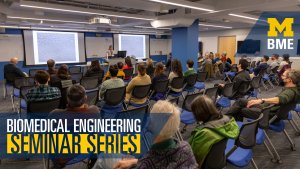Presented By: Biomedical Engineering
Multi-Scale Systems Analysis of Metabolic and Mechanical Determinants of Reserve Cardiac Power Output
Biomedical Engineering (BME 500) Seminar Series - Daniel Beard, PhD

Abstract:
Exercise capacity, a central factor in determining quality of life in healthy aging as well as cardiovascular disease, is determined by a systems-level interaction of factors that are intrinsic to the heart and myocardium and factors that are extrinsic to the heart. Cardiac intrinsic factors include the metabolic power supply and mechanical pumping power of the myocardium. Extrinsic factors include the capacity of the peripheral vasculature to vasodilate in response to increasing demands of exercising musculature and the autonomic chemo- and baroreflexes.
We have developed a whole-heart and whole-body cardiovascular modelling framework to capture and test hypotheses on how specific myocardial, autonomic, and vascular mechanisms determine physiological limitations to cardiac power and output reserve and contribute to diminished left-ventricular power output (LVPO) and exercise intolerance in heart failure. Simulations are driven by a multi-scale model of myocardial metabolism and mechanics. Simulations based on a model parameterization representing a healthy young subject may be used to explore, from a theoretical perspective, if and how myocardial ATP supply can affect myocardial mechanics and power reserve. As an emergent property, the integrated model accurately predicts the oxygen cost of contraction during rest and exercise, yielding the correct quantitative relationship between mechanical power output (in the in vivo whole-body setting) and myocardial mitochondrial oxidative phosphorylation (reflected in myocardial oxygen demand). Simulations also reveal that, under physiological conditions, the myocardial capacity to synthesize ATP at a free energy level needed to drive myocardial mechanics reaches its maximal value at maximal exercise. Thus these theoretical predictions are consistent with the concept that the myocardial energy supply capacity limits physiological cardiac power capacity.
Bio:
Dr. Beard is a Professor in the Department of Molecular and Integrative Physiology and holds affiliate appointments in Biomedical Engineering and Emergency Medicine. His laboratory is focused on systems engineering approaches to understanding the biophysical and biochemical operation of physiological systems. Dr. Beard is the Director of the Virtual Physiological Rat (VPR) project, supported as an NIH National Center for Systems Biology, working to analyze, interpret, simulate, and ultimately predict physiological function in health and disease.
Dr. Beard earned an MS in Applied Mathematics and PhD in Bioengineering in 1997 under the supervision of Dr. James Bassingthwaighte at the University of Washington. After completing his PhD he conducted postdoctoral research at the Courant Institute of New York University, and as a Howard Hughes Medical Institute Postdoctoral Fellow. Before joining the University of Michigan, he was Professor of Physiology at the Medical College of Wisconsin.
Zoom:
https://umich.zoom.us/j/91712262512
Exercise capacity, a central factor in determining quality of life in healthy aging as well as cardiovascular disease, is determined by a systems-level interaction of factors that are intrinsic to the heart and myocardium and factors that are extrinsic to the heart. Cardiac intrinsic factors include the metabolic power supply and mechanical pumping power of the myocardium. Extrinsic factors include the capacity of the peripheral vasculature to vasodilate in response to increasing demands of exercising musculature and the autonomic chemo- and baroreflexes.
We have developed a whole-heart and whole-body cardiovascular modelling framework to capture and test hypotheses on how specific myocardial, autonomic, and vascular mechanisms determine physiological limitations to cardiac power and output reserve and contribute to diminished left-ventricular power output (LVPO) and exercise intolerance in heart failure. Simulations are driven by a multi-scale model of myocardial metabolism and mechanics. Simulations based on a model parameterization representing a healthy young subject may be used to explore, from a theoretical perspective, if and how myocardial ATP supply can affect myocardial mechanics and power reserve. As an emergent property, the integrated model accurately predicts the oxygen cost of contraction during rest and exercise, yielding the correct quantitative relationship between mechanical power output (in the in vivo whole-body setting) and myocardial mitochondrial oxidative phosphorylation (reflected in myocardial oxygen demand). Simulations also reveal that, under physiological conditions, the myocardial capacity to synthesize ATP at a free energy level needed to drive myocardial mechanics reaches its maximal value at maximal exercise. Thus these theoretical predictions are consistent with the concept that the myocardial energy supply capacity limits physiological cardiac power capacity.
Bio:
Dr. Beard is a Professor in the Department of Molecular and Integrative Physiology and holds affiliate appointments in Biomedical Engineering and Emergency Medicine. His laboratory is focused on systems engineering approaches to understanding the biophysical and biochemical operation of physiological systems. Dr. Beard is the Director of the Virtual Physiological Rat (VPR) project, supported as an NIH National Center for Systems Biology, working to analyze, interpret, simulate, and ultimately predict physiological function in health and disease.
Dr. Beard earned an MS in Applied Mathematics and PhD in Bioengineering in 1997 under the supervision of Dr. James Bassingthwaighte at the University of Washington. After completing his PhD he conducted postdoctoral research at the Courant Institute of New York University, and as a Howard Hughes Medical Institute Postdoctoral Fellow. Before joining the University of Michigan, he was Professor of Physiology at the Medical College of Wisconsin.
Zoom:
https://umich.zoom.us/j/91712262512